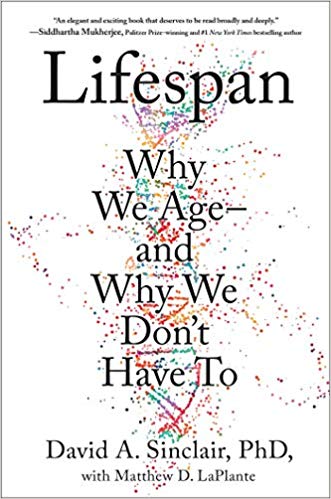Today is the start of 2020. A lot of us was and is enjoying our year end holiday. What did you do during your holiday?
For me, it is a time of reflection and reading, and today I want to introduce a book that I read Lifespan: Why We Age– and Why We Don’t Have to, by Harvard professor David Sinclair .

This book addresses a concern that we must face at one point or another in our life, namely, how to face death, or rather, how to not face death. What does our science have to say about it?
According to David Sinclair, yes, we can indeed, postpone death forever. Because there is no physical, chemical or biological laws that forbid eternal life, and he has recent advancement in scientific research to back him up.
Recently, scientists demonstrated that by activating certain vitality genes ( going by the names such as SIRT2 gene ) via genetic reprogramming, one can make mice live longer, healthier and even younger lives. Not only that, by subjecting mice to a certain lifestyle, such as eating calorie restricted diet, doing exercise and subjecting to extreme temperatures ( of course not so extreme that the mice die), the mice can also live longer, healthier and younger.
Based on this, and other researches with demonstrable effects in mice, David Sinclair proclaims boldly that the time has come finally for old age to be cured. Old age is just another form of diseases such as chickenpox that must be eradicated. Human can theoretically live forever and still remain healthy by repeatedly curing the old age. Immortality!
The promise sounds too good to be true. But how much of it is proven by science, and how much else is mere extrapolation?
We can definitely increase the mice lifespan, this we know for certain, but anything else, including the human dream for immortality is just mere extrapolation.
Not to say the same interventions will certain not work in human, but at this point we just don’t know as human is infinitely more complicated and different than mice, genetically speaking. By saying things like this, David Sinclair is becoming a polarizing figure in the longevity research field. His colleague might be having the same thinking and same goal as him, but they just won’t say it out loud. Scientists are not supposed to be overpromising after all.
They say in sales, you have to promise heaven and earth despite getting there is still a long way, so by this measure David Sinclair is a great salesman. As I flipped through the book I just couldn’t stop wondering won’t it be wonderful if he was right and his dream to live until the end of 2100– by then he would be 130 years old– came true? Yes, of course! Such is the mesmerizing power of the book, I was infected by the energy, enthusiasm and optimism radiated from within the pages throughout the course of reading. I also want to live that long, and remain healthy and productive!
So, despite the fact that longevity research is still in early stage, and despite that all the interventions are not yet proven to be working in human– and most likely most will be a disappointment– it does seem to me that this is the Next Big Thing. Forget about bitcoin, I believe that when we look back 100 years later, it will be relegated to the footnote of the history, as an Exhibit A of how overhyped technologies look like.
But the search to live long and young shall never go in vain. Even if we fail to extend human life indefinitely, our efforts will still be useful because the longevity research also helps to delay or stop altogether the diseases that plague us. We might not be able to live forever, but we can live longer and healthier, thanks to to longevity research.
But you might sensibly ask: wouldn’t living longer contribute to global warming, overpopulation, famine and an array of other problems? Have us, the human, not done enough to damage the planet via overpopulation and overconsumption? And can you imagine a dictator living forever and terrorizing his subjects forever? What about the damages to science? Max Planck once said that science advances one funeral at a time, do we really want old pariah of science holding back the scientific progress because they just won’t die? And what about the inequality gap between the rich and the poor, one can certainly imagine that the rich can cheat death more easily just because they have more money. So won’t the search for Elixir accentuate the wealth gap by removing altogether the one last equalizing force– death?
These are all thorny and valid issues, to which Sinclair also discusses in his book, and to which he doesn’t have satisfactory answers for. As much as I care for these issues, I believe that we shouldn’t let them hinder the goal, which is to make you and I, and our offsprings live longer, healthier and in a more meaningful way. The solutions for these issues will arise, sooner or later, even though we don’t yet know how.

There is something for everyone, even the skeptics:
Even if you don’t believe in the grandiose claim of the book, I believe that you will still find some of the advices useful, such as:
- Eat less.
- Cut out meat and sugar
- Exercise regularly





